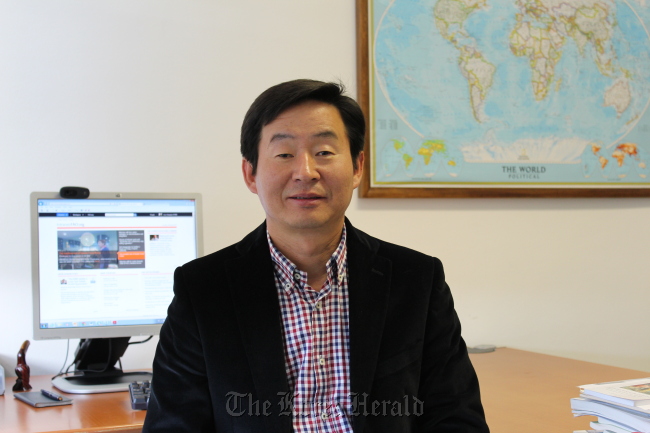Korea’s green policy success inspires world forest forum
By Korea HeraldPublished : March 21, 2013 - 19:42
Korea is often recognized for its fast economic growth over the past decades but it is also an unprecedented model example in forest recovery, an achievement which should be actively promoted in the global society, said an official of the Korea Forest Service.
“All senior citizens would remember back in the 1970s when most of country’s landscape was bare,” said KFS director Lee Chang-jae.
“But through a series of long-term tree-planting projects, Korea has turned the post-war wreckage into a green landscape.”
Lee is currently working on dispatched duty at the headquarters of the United Nations Food and Agriculture Organization, in Rome, Italy.
“As an official of the KFS, I have been involved in various forestation sectors, including erosion control and tree preservation,” he said.
“It was, however, after I came to the FAO headquarters and saw Korea from an outside perspective that I truly realized how much we had actually achieved.”
Forestation is a complex issue that goes far beyond tree-planting but involves the socio-economic environment of the corresponding country, he explained.
According to a FAO case study in 1982, Korea’s green success was attributable to two major reasons ― a broad-based approach and cooperative government-civil cooperation.
“All senior citizens would remember back in the 1970s when most of country’s landscape was bare,” said KFS director Lee Chang-jae.
“But through a series of long-term tree-planting projects, Korea has turned the post-war wreckage into a green landscape.”
Lee is currently working on dispatched duty at the headquarters of the United Nations Food and Agriculture Organization, in Rome, Italy.
“As an official of the KFS, I have been involved in various forestation sectors, including erosion control and tree preservation,” he said.
“It was, however, after I came to the FAO headquarters and saw Korea from an outside perspective that I truly realized how much we had actually achieved.”
Forestation is a complex issue that goes far beyond tree-planting but involves the socio-economic environment of the corresponding country, he explained.
According to a FAO case study in 1982, Korea’s green success was attributable to two major reasons ― a broad-based approach and cooperative government-civil cooperation.

“The Korea government had a clear sense of purpose when it came to restoring forests and its top-down policies were explicit, which consecutively influenced the private sector as well,” Lee said.
The cheap labor costs, too, were a positive factor, he added.
“The United States is currently in urgent need to improve its forest environment but is hampered by the high labor costs,” the KFS official said.
“What Korea did with its forest over the years may be regarded a miracle, a superb combination of all related factors.”
Lee’s role in the FAO office is to promote a clean development mechanism, especially for developing Asian countries.
“The international forestation forum, including the FAO, took deep interest in Korea’s forest projects,” he explained.
“As Korea, on the other hand, has been seeking to up its leverage in the global community, the FAO-KFS relationship came to be a mutually beneficial one.”
Despite deforestation worldwide and active ongoing restoration projects, the level of public awareness is yet unfortunately low, Lee said.
“Clean air and water, the factors which sustain a healthy natural environment, cannot exist without forests,” he said.
Out of the 4 billion hectares of forest land, 800 million hectares are currently classified as degraded, Lee explained.
Though Korea has an advanced culture of natural preservation, it is yet to take caution to maintain a balance with development, he said.
“We live in a relatively small area of land where mountains and forests may easily come down to development targets,” he said.
“The people and the government need to understand that the preservation and restoration of forests is not just an ethical issue but a significant factor in the nation’s image and power in the global society.”
By Bae Hyun-jung (tellme@heraldcorp.com)
-
Articles by Korea Herald


















![[Eye Interview] 'If you live to 100, you might as well be happy,' says 88-year-old bestselling essayist](http://res.heraldm.com/phpwas/restmb_idxmake.php?idx=652&simg=/content/image/2024/05/03/20240503050674_0.jpg&u=)
